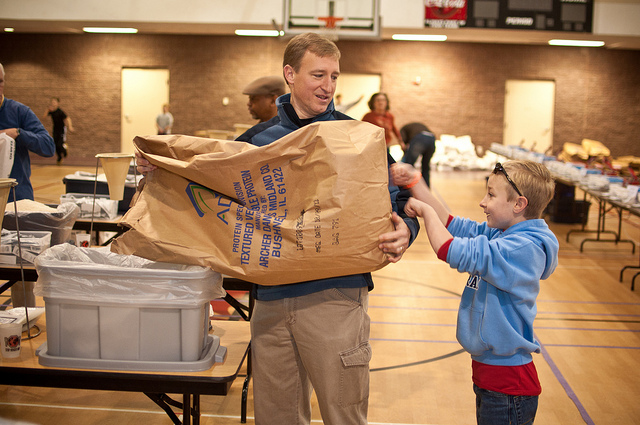Parents have the hardest job on the planet.
But as parents, our actions must speak louder than our words (that sounds like having to be a full-blown-grown-up).
The truth is, since our children learn by example, in order to teach our kids to be socially conscious individuals, we, as parents, must edit our behavior. Sounds easy enough, but if the little angels are watching every thing we do, where does one start?
Ask yourself if your needs and wants, as well as your goals and your accountability align with your values.
Aligning these three things with core values can make a world of difference in how our kids interact with the world around them.
For instance, do the magazines you get and flip through each night (celebrity gossip/tabloids/beauty) focus on the ideals you want for your kids or are they society-driven and mostly unattainable? Does buying a new car every couple of years, and/or rewarding yourselves with a latte or shoes, or the latest video game for your kids, send the message that your wants overshadow your needs?
Wanting a new pair of shoes or new video game isn’t unreasonable, but clearly defining those items as wants versus needs becomes an important differentiator. That doesn’t sound like much fun, does it?! But, I promise it is easy and rewarding.
Needs, goals and accountability.
Moving beyond talk to action requires committing to specific actions. These actions help us obtain our the goals and hold us as accountable individuals (and if we’re lucky, grown-ups). Our children are no different. The sooner they can learn these invaluable skills, the better the world will be for them as socially-responsible beings.
Here are three sure-fire steps you can start right away.
Needs vs. wants.
• Children must learn the difference between needs and wants. Share stories from other parts of the world where children struggle to get their essential needs met (water, food, shelter). Contrast that with your kid’s daily lives and have them evaluate a need versus a want that is relevant in their life.
• Take this concept one step further and volunteer with your children feeding the homeless or operating a lemonade stand with proceeds going to families in need in your community. Having your kids interact with other socio-economic groups, in your community, develops a good sense of self and what it means to give back.
• We all have wants. Make sure your children know a real need versus a simple want and help them figure out a way you both can agree upon, to get the want.
Goals.
• One goal we should have in raising socially conscious children is to teach kids that hard work is rewarded and that everything is not simply handed to them (we all don’t get ribbons for going into work every day). We are doing our children a disservice by letting them believe that simply showing up deserves a reward.
• The fact of the matter is, life isn’t easy and you have to work hard to get what you want out of life. In order to get the latest cell phone or video game, decide upon a mutually-agreed upon arrangement ahead of time.
For example, if the child saves half of the cost of the item, you will share the cost with him/her. Or have them save for the entire cost of the item ~ you’ll see how much they really want something when they’re given this goal. “Want” based goals are easier for younger children and a good starting point for most. If your child has a different motivator, use that to your advantage (remember, you’re the grown-up), and the goal becomes that much more desirable.
The exception to this rule is not to use candy or food since these “goals” can lead to bad eating habits in the future.
• Goals should not only be about what we want out of our lives but what we want to give back as well. Raising socially-responsible children requires us to think of the community (and the world) at large. As your children get older, goals outside their own scope become easier. Start small and discuss the actions items needed to obtain each goal.
Baby steps win the race.
Accountability.
• Even if your family is fortunate to have a stay-at-home parent or a housekeeper, make sure your child still does his or her own chores around the house. (Make their own bed everyday, do the dishes or take out the trash). And in return they get an allowance. Remember the allowance? Many of us were raised with this genius concept but somehow it has fallen on the wayside and our kids expect and are simply given, money.
The buck stops here. If you want it, you need to earn it.
• Not only are we doing kids a huge disservice by not teaching them to be responsible people, they aren’t learning the value of a hard-earned-dollar. The allowance will allow them to save for their goals and also give you some help around the house. A win-win!
• Talk about all decisions in terms of choices so that they understand what being accountable really entails. Going back to the money example, “We could go buy ice cream, but you wanted to save for a new baseball bat to improve your game. Which would you rather have?” Empowering kids to make choices and talking them through the decision-making process is a great accountability lesson.
Our kids are watching us constantly and learning from our successes and failures.
Educate and empower them to make smart choices. It may seem obvious but we must remember that we are a reflection of our children and our needs/wants, goals, and accountability actions must mirror our values.
Yep, it can really suck being a grown up. We may have had parents that were self-focused, but we can break the cycle and raise our kids to better relate to the world around them.
We can foster habits that result in socially conscious individuals who live a better life, one step at a time.
~
Relephant Read:
6 qualities to Instill in our Children so they can Change the World.
~
Author: Therese Patterson
Apprentice Editor: Kristi Trader/ Editor: Ashleigh Hitchcock
Photo: Micah Taylor- flickr







Read 0 comments and reply